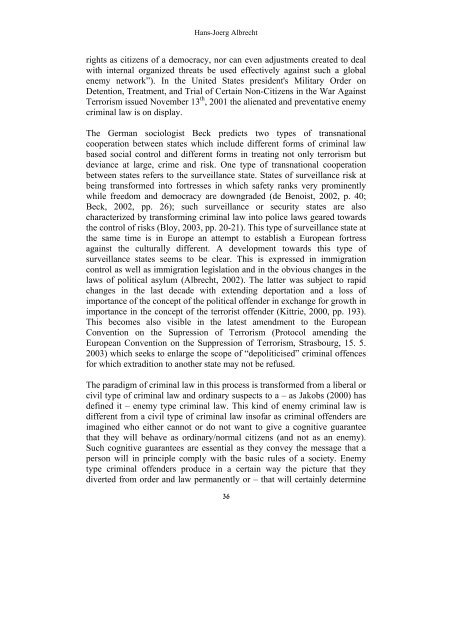222467to222472
222467to222472
222467to222472
You also want an ePaper? Increase the reach of your titles
YUMPU automatically turns print PDFs into web optimized ePapers that Google loves.
Hans-Joerg Albrecht<br />
rights as citizens of a democracy, nor can even adjustments created to deal<br />
with internal organized threats be used effectively against such a global<br />
enemy network”). In the United States president's Military Order on<br />
Detention, Treatment, and Trial of Certain Non-Citizens in the War Against<br />
Terrorism issued November 13 th , 2001 the alienated and preventative enemy<br />
criminal law is on display.<br />
The German sociologist Beck predicts two types of transnational<br />
cooperation between states which include different forms of criminal law<br />
based social control and different forms in treating not only terrorism but<br />
deviance at large, crime and risk. One type of transnational cooperation<br />
between states refers to the surveillance state. States of surveillance risk at<br />
being transformed into fortresses in which safety ranks very prominently<br />
while freedom and democracy are downgraded (de Benoist, 2002, p. 40;<br />
Beck, 2002, pp. 26); such surveillance or security states are also<br />
characterized by transforming criminal law into police laws geared towards<br />
the control of risks (Bloy, 2003, pp. 20-21). This type of surveillance state at<br />
the same time is in Europe an attempt to establish a European fortress<br />
against the culturally different. A development towards this type of<br />
surveillance states seems to be clear. This is expressed in immigration<br />
control as well as immigration legislation and in the obvious changes in the<br />
laws of political asylum (Albrecht, 2002). The latter was subject to rapid<br />
changes in the last decade with extending deportation and a loss of<br />
importance of the concept of the political offender in exchange for growth in<br />
importance in the concept of the terrorist offender (Kittrie, 2000, pp. 193).<br />
This becomes also visible in the latest amendment to the European<br />
Convention on the Supression of Terrorism (Protocol amending the<br />
European Convention on the Suppression of Terrorism, Strasbourg, 15. 5.<br />
2003) which seeks to enlarge the scope of “depoliticised” criminal offences<br />
for which extradition to another state may not be refused.<br />
The paradigm of criminal law in this process is transformed from a liberal or<br />
civil type of criminal law and ordinary suspects to a – as Jakobs (2000) has<br />
defined it – enemy type criminal law. This kind of enemy criminal law is<br />
different from a civil type of criminal law insofar as criminal offenders are<br />
imagined who either cannot or do not want to give a cognitive guarantee<br />
that they will behave as ordinary/normal citizens (and not as an enemy).<br />
Such cognitive guarantees are essential as they convey the message that a<br />
person will in principle comply with the basic rules of a society. Enemy<br />
type criminal offenders produce in a certain way the picture that they<br />
diverted from order and law permanently or – that will certainly determine<br />
36


